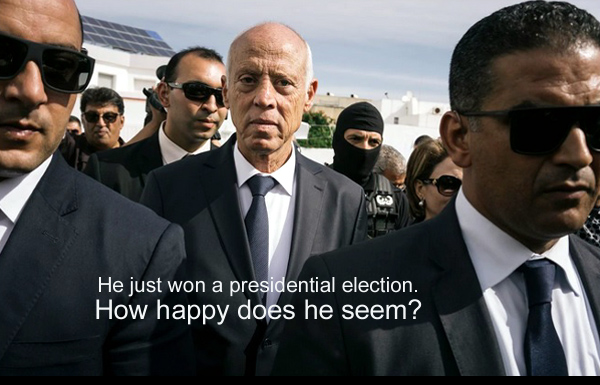 OK, buckle up. I’m going to show how last night’s democratic debate explains this week’s Tunisian presidential election.
OK, buckle up. I’m going to show how last night’s democratic debate explains this week’s Tunisian presidential election.
Right. Do all those dem candidates even know where Tunisia is? (Do you?)
A complete outsider won the Tunisian presidential election, Kais Saeid, with an unbelievable 73% of the votes cast. Last night’s democratic debate pitted outsiders against insiders.
The common wisdom borne of extreme caution is that the lovable insider will prevail. Guess what, that’s not happening. It didn’t happen in any election worldwide this year, and the latest one was in Africa, in Tunisia where it really didn’t happen Big Time.
In a country with very sophisticated and mature political parties, Saeid is affiliated with no party, a true independent. He was never in government before. He was never an adviser to government before. The Washington Post called him “an obscure academic who hardly campaigned and had to borrow money to register as candidate.”
Saeid was the Ultimate Outsider.
His challenger was a billionaire media mogul that many in Africa call “Tunisia’s Trump.” Nabil Karoui was also an outsider as far as elections go, and he had an astounding political ascent himself, garnering huge contributions and wide media attention while he was in jail!
Right and Left don’t matter.
Karoui was an avowed man of the Right. Saeid was an avowed man of the Left but he is also a radical Islamist, who are often rightist. (Unlike America’s Christian right Tunisian Islamists are unrelenting. They refused to support Karoui, a man who had been convicted of tax fraud, but more importantly an avowed wheeler-dealer.)
The two were cast in the run-off after a hard-fought initial election among 26 candidates! Karoui polled the highest in the first round.
The Post characterized this final election with a quote from one 45-year old: “I am fed up with the political system.”
Taxes, health care, even defense – they don’t matter as much as “fed up with the system.”
In the end the Tunisian electorate decided even if Karoui had never been in politics, he was a stalwart, long-serving man of the “system.” That was true. He was a part of the elite that wheeled and dealt elections as much as businesses.
Saeid is a diminutive, introverted retired professor who wasn’t anything but a retired professor.
Both espoused nearly the same social and political goals, and what’s more, even the details and plans to achieve them! The one big difference between them was Saeid’s “vow to change the system.”
Saied didn’t just mean behaviors. Saeid wants to change democracy. Rather than the current parliamentary system he wants to devolve all government into small local units. (The lesser insiders last night in the debate want to change the Supreme Court; the insiders don’t.)
Each unit – village, county or small ethnic groupings – would elect officials, and those officials would elect the next tier of officials who would become part of the legislature.
Radical changes in the constitutional system are much easier in newer democracies like Tunisia than in the U.S., where constitutional change is almost impossible. So it’s a truly plausible idea in Tunisia.
But “being fed up” is universal. Defining Insiders and Outsiders is what matters.
Isn’t this what all countries’ “peoples” are saying? And might it not be true? What commonality threads all these multitude of systems together? Globalization, I think, and globalization based on capitalism – or at least the unregulated capitalism of our age. That’s my analysis, anyway.
But listen to the Tunisians. Pox on Insiders. Hallelujah for the Outsiders.